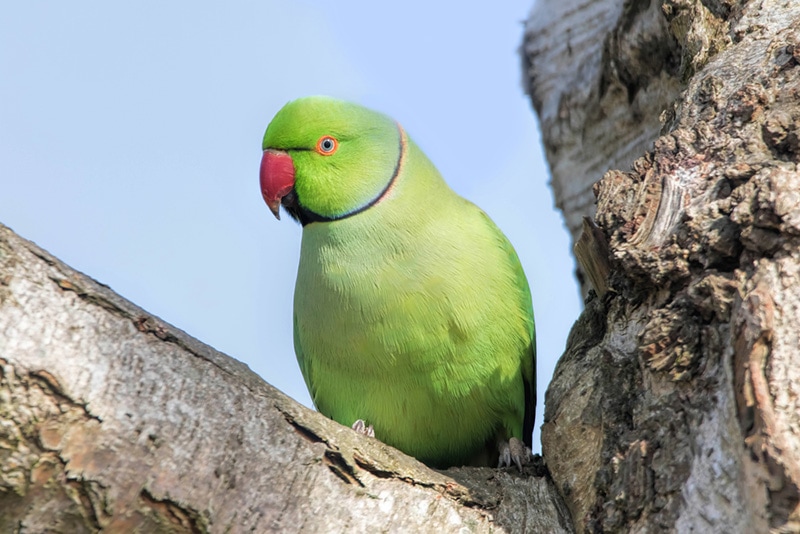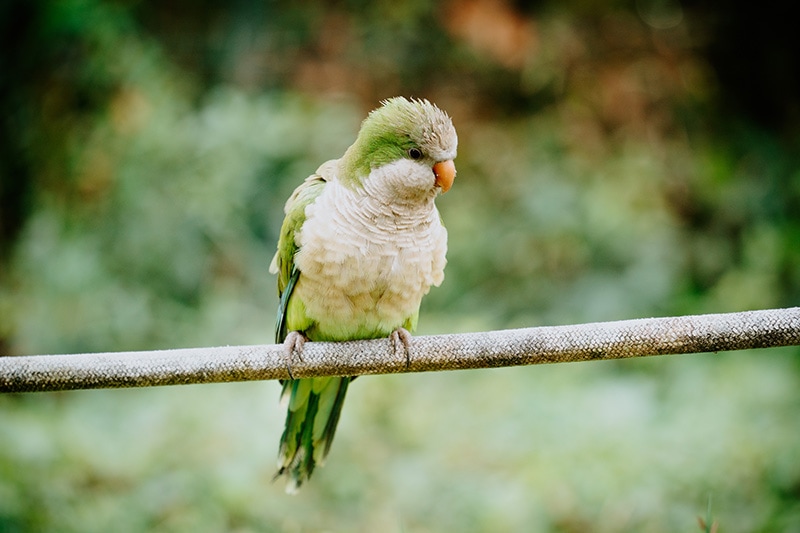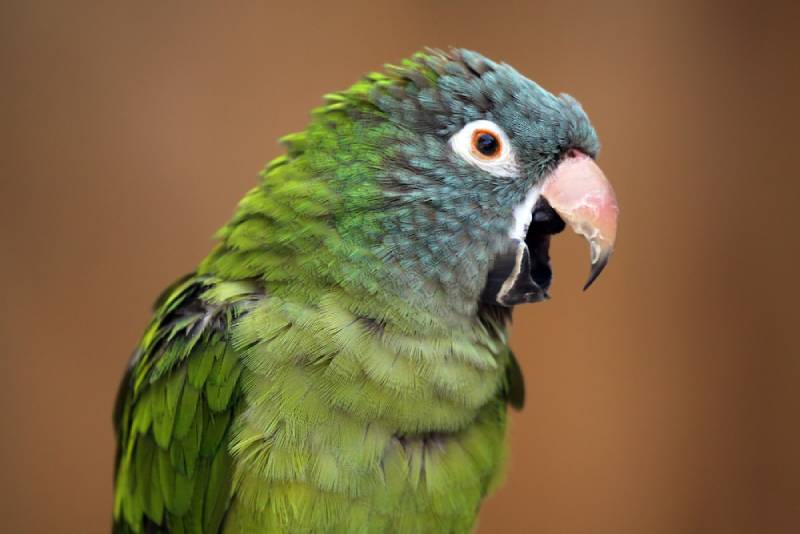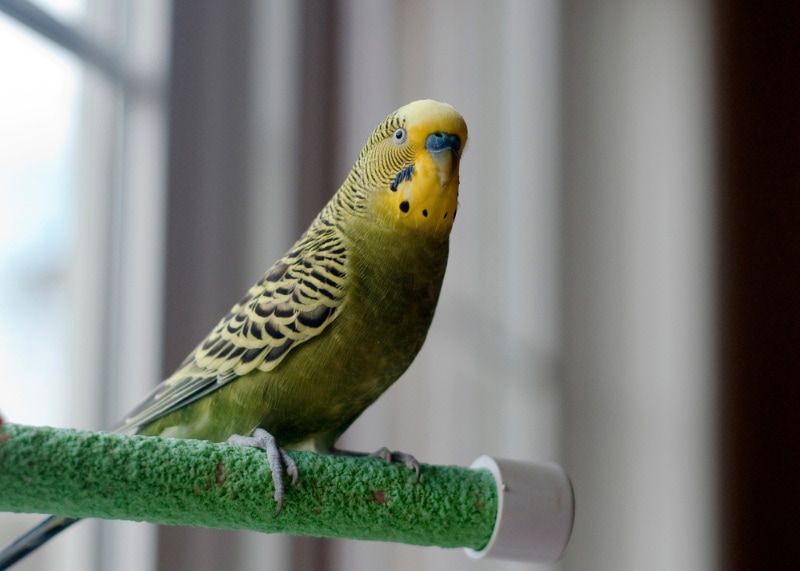Can Parakeets Eat Pomegranate? Vet Approved Nutrition Facts & FAQ
By Jessica Kim
Updated on

Disclaimer: This article has been reviewed by a qualified veterinarian using information available at the time of review. It should not be construed as veterinary advice tailored to your bird. Bird owners are urged to consult with their veterinarian when making dietary decisions for their pet.
Parakeets can enjoy eating a varied diet, and they usually love snacking on fruit. While some fruits can be dangerous, pomegranates are safe for parakeets to eat. However, it’s important to note that fruit should never take up a majority of their diet. So, it’s best to give pomegranates as special treats or occasional snacks to your parakeet.
Because there are so many parrot species, all with their own specific dietary needs, we are going to focus on Rose-ringed Parakeets (Psittacula krameri) and pomegranates for this article. But before we dive into discussing feeding pomegranates to Rose-ringed Parakeets, it’s important to note that many bird species are endangered or threatened. To protect and promote ethical breeding practices, make sure to only get your parakeets from a reputable and trustworthy parakeet breeder.
Are Pomegranates Safe for Rose-ringed Parakeets to Eat?
Some people may be hesitant to feed Rose-ringed Parakeets pomegranates because of the seeds. This is understandable as some fruit seeds, such as apples, apricots, and pears, contain cyanide compounds. Other kinds of seeds may be a choking hazard to parakeets.
Fortunately, pomegranate seeds are completely safe to eat, and parakeets have an easy time eating and digesting a few. They also contain many beneficial nutrients that can help boost your parakeet’s health. However, we can’t get carried away and feed Rose-ringed Parakeets large amounts of pomegranate seeds. They don’t meet their daily dietary needs and too much can cause a gastrointestinal upset, so your Rose-ringed Parakeet can’t survive on just pomegranates alone.

Frequently Asked Questions
Providing a complete and well-balanced diet for your Rose-ringed Parakeet is essential to their health and well-being. Here’s what you need to know before adding pomegranates to your Rose-ringed Parakeet’s diet.
Are Pomegranates Nutritious?
Pomegranate seeds are nutrient-dense, and they’re often regarded as a superfood. They’re an excellent source of essential vitamins and minerals, including folate, potassium, and magnesium. Folate is necessary for reproduction, red blood cell formation and waste excretion. Magnesium is needed for energy production and bone formation and potassium helps maintain blood pressure and acid-base balance in the body.

Can I Give My Rose-ringed Parakeet Pomegranate Juice?
It’s best to avoid giving your Rose-ringed Parakeet pomegranate juice because it often contains added sugars, flavorings, and preservatives. If you want to give your Rose-ringed Parakeet pomegranate juice, it’s best to make your own by blending pomegranate seeds and putting them through a sieve or strainer. Just keep in mind that pomegranates are a natural dye, and the juice can stain your parakeet’s beak and feathers.
How Many Pomegranates Can I Feed My Rose-ringed Parakeet?
While pomegranates are a low-calorie food, it’s still best to feed your Rose-ringed Parakeet just a few pomegranate fruit-covered seeds (arils) at a time. This is because pomegranates don’t sufficiently meet all of their nutritional needs.
A healthy number of pomegranates would be just several arils per day. It’s also helpful to prevent pickiness by offering pomegranates only every other day. Most parakeets will love eating pomegranate seeds and can end up becoming pickier about their food. They may become less enthusiastic about eating their regular daily meal. It’s important not to resort to feeding your Rose-ringed Parakeet just treats that they like if they refuse to eat their regular food.

What’s the Best Way to Feed My Rose-Ringed Parakeet Pomegranates?
Some Rose-ringed Parakeets may be hesitant to try new foods, but most will be attracted to the seed’s bright color and be open to tasting it. Start by giving your Rose-ringed Parakeet just one aril. Place it on an empty food tray and wait for your parakeet to approach it on its own. They will most likely enjoy eating the seed. However, if they don’t show any interest, there’s no need to spend a lot of effort in getting them to eat it. Pomegranates aren’t necessary to their diet, and there will be plenty of other fruits that they can enjoy eating.
If it’s your parakeet’s first time eating a pomegranate seed, make sure to monitor them and be on the lookout for signs of an upset stomach such as changes in droppings, reduced appetite, regurgitation or staining around the vent. If your Rose-ringed Parakeet shows any concerning signs of digestive issues, make sure to consult your veterinarian right away.
If your parakeet is able to eat pomegranate seeds without any issues, you can gradually increase the amount that you give them. It’s often best to give them to your parakeet as a midday snack after they’ve eaten their main meal. Don’t mix pomegranates with their meals because the seeds can dampen the food and cause it to spoil. Mixing pomegranates can also cause some birds to become picky and cause food to spill out of their food bowls as they search for pomegranate seeds.
Conclusion
Pomegranates are a safe and low-calorie fruit that Rose-ringed Parakeets will usually love eating. Just keep in mind that they should only be given as snacks and not take up a majority of your pet bird’s diet. So, the next time you’re about to snack on some pomegranates, make sure to save a few seeds for your parakeet. They’ll enjoy eating it with you and snacking together will be another great way to bond and spend time with each other.
Featured Image Credit: Fruchthandel Magazin, Pixabay











